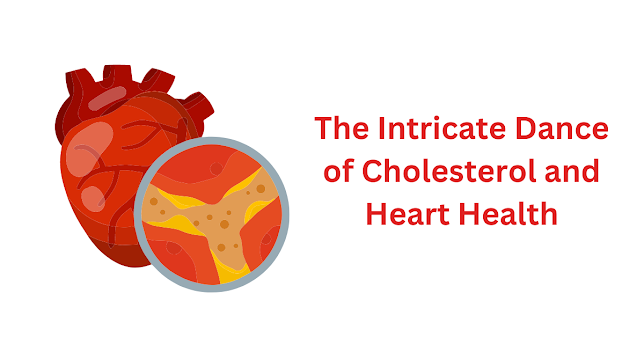The Intricate Dance of Cholesterol and Heart Health
Introduction
Cholesterol is a fatty substance that often gets a bad rap. Mention the word, and many people immediately think of heart disease and blocked arteries. While it's true that high cholesterol levels can contribute to heart problems, the relationship between cholesterol and heart health is much more nuanced than most people realize. In this article, we will delve into the intricate dance of cholesterol and its connection to heart health.
Understanding Cholesterol
For the human body to operate properly, cholesterol is necessary. It is a critical component of cell membranes and is required for the synthesis of hormones, vitamin D, and bile acids that aid in digestion. Our bodies produce cholesterol naturally, primarily in the liver, but we also get it from the foods we eat. Cholesterol is transported through the bloodstream by lipoproteins, mainly low-density lipoprotein (LDL) and high-density lipoprotein (HDL).
LDL Cholesterol: The "Bad" Cholesterol
Low-density lipoprotein (LDL) cholesterol is often referred to as "bad" cholesterol because elevated levels of LDL can increase the risk of heart disease. LDL particles carry cholesterol from the liver to the cells that need it but can become problematic when there is an excess. If there's too much LDL cholesterol circulating in the bloodstream, it can start to accumulate on the inner walls of arteries, forming plaques. These plaques can narrow the arteries and reduce blood flow, a condition known as atherosclerosis.
Atherosclerosis is a significant contributor to heart disease, as it can lead to the development of coronary artery disease (CAD) and increase the risk of heart attacks and strokes. The more LDL cholesterol in the blood, the greater the potential for plaque formation.
HDL Cholesterol: The "Good" Cholesterol
High-density lipoprotein (HDL) cholesterol, often referred to as "good" cholesterol, plays a protective role in heart health. HDL particles help remove excess cholesterol from the bloodstream and transport it back to the liver, where it can be processed and eliminated from the body. This process is known as reverse cholesterol transfer.
Having higher levels of HDL cholesterol is associated with a reduced risk of heart disease because it helps clear away the cholesterol that could otherwise build up in the arteries. For this reason, healthcare providers often emphasize the importance of raising HDL levels as a means of improving heart health.
The Cholesterol-Heart Connection
Now that we understand the basics of LDL and HDL cholesterol, Through the insights shared by the top cardiologist in coimbatore, let's explore the intricate connection between cholesterol and heart health:
Atherosclerosis and Plaque Formation: High levels of LDL cholesterol are a primary contributor to atherosclerosis, a condition where plaque accumulates in the arteries. Over time, these plaques can become hardened and narrow the arteries, making it harder for blood to flow. This reduced blood flow can lead to chest pain (angina) and increases the risk of heart attacks and strokes.
Inflammation and Oxidation: The role of inflammation and oxidative stress in heart disease is gaining attention. LDL cholesterol, especially when it's oxidized, can trigger inflammation in the arteries. Inflamed arteries are more prone to plaque formation and rupture, which can lead to acute cardiovascular events.
Role of Triglycerides: Triglycerides are another type of fat found in the bloodstream. Elevated triglyceride levels are often associated with high LDL cholesterol and low HDL cholesterol, creating an unfavorable lipid profile. The likelihood of heart disease may rise as a result of this combination.
Genetic Factors: Genetics can influence cholesterol levels. Some individuals may inherit genes that predispose them to high LDL cholesterol, regardless of their lifestyle choices. This genetic predisposition can significantly impact heart health.
Diet and Lifestyle: Diet and lifestyle choices play a crucial role in cholesterol levels and heart health. A diet high in saturated and trans fats can increase LDL cholesterol levels, while a diet rich in fruits, vegetables, whole grains, and healthy fats can help lower LDL cholesterol and raise HDL cholesterol.
Medications: In cases where lifestyle changes are insufficient, healthcare providers may prescribe medications to manage cholesterol levels. Statins, for example, are a common class of drugs used to lower LDL cholesterol and reduce the risk of heart disease.
Conclusion
The connection between cholesterol and heart health is a complex and dynamic one. While high levels of LDL cholesterol can increase the risk of heart disease by contributing to atherosclerosis, it's essential to remember that cholesterol is not inherently evil. Cholesterol is a vital substance required for various bodily functions, including the production of hormones and cell membranes.
Maintaining a healthy balance of cholesterol involves not only managing LDL cholesterol levels but also promoting higher levels of protective HDL cholesterol. This balance is influenced by genetics, diet, lifestyle choices, and, when necessary, medication.
Understanding the intricate dance of cholesterol and its connection to heart health empowers individuals to make informed decisions about their lifestyle, diet, and healthcare. Regular check-ups with healthcare providers can help assess cholesterol levels and determine personalized strategies for heart disease prevention.
In conclusion, cholesterol is not the sole villain in the story of heart health. It's a critical player in a complex narrative, and by understanding its role and taking proactive measures, we can work towards maintaining a healthy heart for years to come.




Comments
Post a Comment